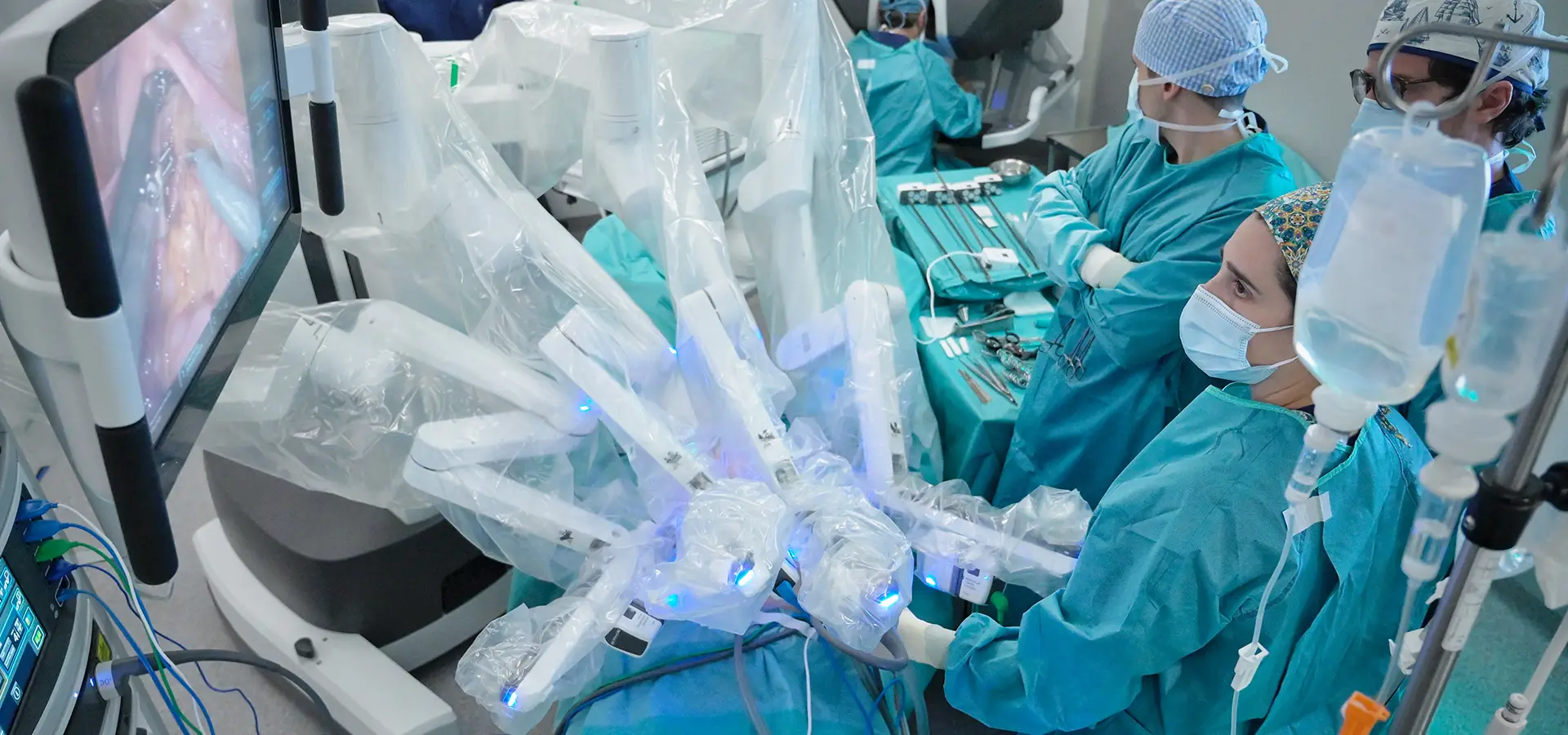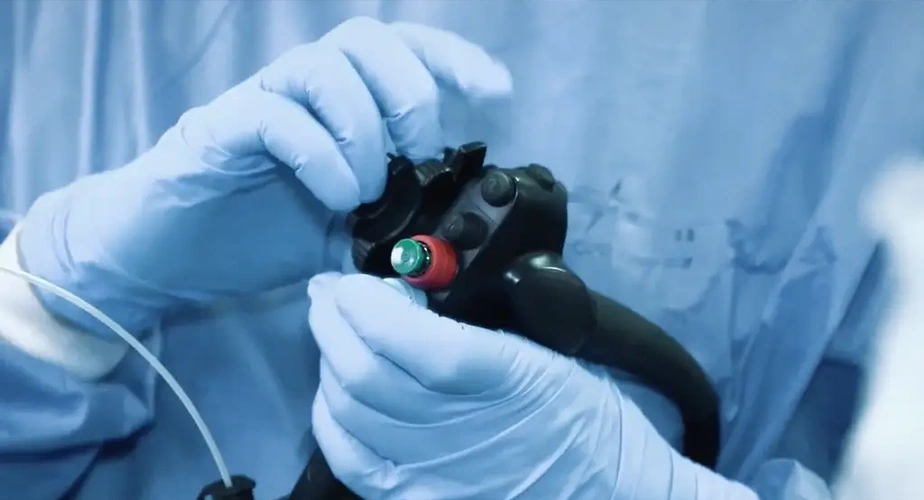Telemedicine, apps, AI & Co.: Using the benefits of digitalization
Digitalization is driving forward new technologies and treatment methods in contact with patients and in the manufacture of products. It can help to overcome challenges in the healthcare sector. Our digital solutions are designed to add value for patients and to continuously improve the quality and efficiency of our therapies.
Digital and efficient
The demand for new digital services is increasing throughout the healthcare sector. Patients are becoming increasingly more receptive to telemedicine treatments, and they want to use services precisely when they need them – on weekdays, when they are on the move, or late in the evening, and at weekends. Moreover, AI-supported analysis tools are becoming increasingly important for applications such as faster identification of colon cancer or pneumonia.
Our goal is to optimize and accelerate internal workflows throughout the Group and in the value chain. Wherever possible, we digitalize current processes or introduce new, digitally supported workflows. This is intended to improve the handling and efficiency of our products and services.
More efficient planning thanks to digitalized logistics
Digitalization of logistics processes offers a number of advantages for our production sites. For example, Fresenius Kabi is already working with track-and-trace systems for its products. This allows the business segment to track medicinal products, syringes, and parenteral infusion solutions. It shows exactly where they are in the delivery process, when they will arrive, and approximately when they will be used up. So called smart labels can be used to monitor hospital inventories and accurately plan when new products need to be delivered.
From appointment bookings to aftercare: Simplified healthcare processes
A lot of digitalized processes intermesh in patient care. This starts when we make preparations to admit patients – for example in videoconferences, or chats with the patient – and comes to an end when we discharge the patient and give them digital options for further recovery on their patient journey. This includes choices like digital aftercare through one of our outpatient clinics, for example for digital wound monitoring after an operation. For a number of years, there have been virtual portals at Helios and Quirónsalud. Patients are able to access treatment documents and results there, book appointments online, and attend video consultations. They can also get information about recommended therapeutic measures for their particular case.
Platform for medical practitioners and patients being treated
84
%of our German and Spanish hospitals offer a digital patient portal.
Have a look at our highlight story to see how Quirónsalud uses smart and digitalized processes to relieve the pressure in the ED.
Apps & Co.: Important information communicated digitally
We want to communicate trust, safety, and security when dealing with illnesses and necessary treatments and products – whether communicating with patients, their relatives or medical professionals. They should all be able to handle a product safely and confidently. We offer various support programs to suit different target groups and product types. For example, Fresenius Kabi publishes information on specific websites in several languages, and provides examples of applications and other practical notes. This allows stakeholders to have barrier-free access to knowledge. Fresenius Kabi has also developed the KetoApp to foster an informed approach to individual health. It supports people with chronic kidney disease and helps them to eat a diet that is varied and appropriate to their disease.
Artificial intelligence: Identifying diseases more quickly
If we make more use of data- and AI-supported analysis methods and procedures in future, this will make healthcare and production even better, faster, and more effective than they are now. We are already increasingly integrating data-driven analyses and decision-making into day-to-day clinical practice, where real-time data volumes are increasingly being generated. Our aim is to use analytics combined with data for implementation of predictive, personalized, preventive, and participative medicine, and thereby significantly further improve treatment outcomes. A current example of application: Quirónsalud has been working since 2022 in emergency departments with an AI-supported algorithm specially developed in-house. This enables the likelihood of bilateral pneumonia to be determined on the basis of laboratory values and other patient parameters before it is visible on an X-ray.
AI in colorectal cancer screening
Our use of AI in colorectal cancer screening is even more profound. When colonoscopies are carried out, a computer algorithm detects polyps in the intestinal mucosa. These are a possible precursor to colon cancer. As soon as the computer detects a polyp, it triggers an optical and acoustic signal, and informs the doctor about the finding. This method enables us to offer our patients more precise care without any additional risk. Want to have a look? Click here for the highlight story.
We are also using the advantages of intelligent automation in areas other than everyday clinical practice. In the areas of supply chain, purchasing, and production, our objective is to improve business processes in administrative functions using such tools as chatbots, intelligent document processing, and recommendation and prediction applications.
A working group established in 2023 has been addressing the issue of how we can and want to use AI at Fresenius. Their goal is to define uniform rules for the development and implementation of applications across the Group. In this way, we want to ensure that the AI programs we use are in accordance with the ethical standards and values of Fresenius.
Robots in the operating room
Even though it might sound like science fiction, robots have become an integral part of many healthcare facilities. Compared with conventional surgery, robot-assisted interventions enable advances like more precise, less invasive interventions, facilitating operations, e.g. where only very small incisions have to be made in the body. As a result, patients are able to recover more quickly. At Quirónsalud and Helios, surgeons carry out robot-assisted interventions in areas such as spine, hip, and knee surgery, as well as in procedures related to cancer.

Digitally controlled infusions
At Fresenius, we are increasingly relying on digitalized processes, and we are also working on the inclusion of digitalized products in our offerings. One example of this is Ivenix. When this technologically advanced infusion system was developed, the needs of patients and hospital personnel were the focus of attention. For example, its large-volume pump operates seamlessly with other systems. Infusion management, and programs and analyses provide nursing staff with the best possible information and prevent infusion-related errors. The system is currently available in the U.S. market.

Cybersecurity: Always playing it safe
Digital therapeutic approaches are capable of improving patient care. While we are continuously digitalizing our processes and opening up new markets with digital product solutions, our patients, employees, and customers should be able to rely on the cybersecurity of our products and services. We are seeking to enhance confidence by implementing various measures to strengthen our resilience to cyberattacks, reduce our cyber risks, and avert any harm or damage. The threat landscape for our company is continually changing and we are consistently carrying out analyses so that we are best prepared. We define minimum security standards for our risk domains and implement strategic security measures. These include upgrading our medical equipment to new cybersecurity requirements and findings.




